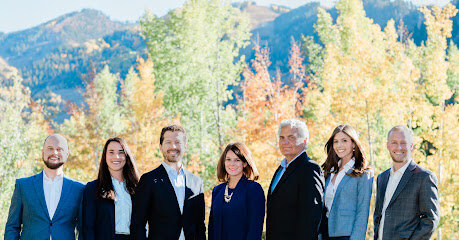Best Will & Testament Lawyers in Colorado
Share your needs with us, get contacted by law firms.
Free. Takes 2 min.
Or refine your search by selecting a city:
List of the best lawyers in Colorado, United States
United States Will & Testament Legal Questions answered by Lawyers
Browse our 1 legal question about Will & Testament in United States and read the lawyer answers, or ask your own questions for free.
- Hi, I like to get the information about my deceased sister government pension in Sind Govt.
- I am living in usa and my sister was the govt employee in pakistan about 25 to 27 years. she was unmarried and my parents also passed. I like to know who will the benifits after her death. She passed during her job. I really appreciate it if you guide... Read more →
-
Lawyer answer by A A Abdullahi Law Firm
Hello, Her next of kin will be you and so you shall be the one to receive the benefits and her properties. You can contact us vfor assistance on the documentation and procession
Read full answer
About Will & Testament Law in Colorado, United States
A Will, also known as a Last Will and Testament, is a legal document that allows a person to specify how their assets and affairs should be handled after their death. In Colorado, state laws govern how Wills are created, executed, and probated. Having a properly drafted Will is essential to ensuring that your wishes are honored and that your loved ones are provided for according to your intentions. Colorado recognizes both formal written Wills and, under specific circumstances, holographic (handwritten) Wills. Without a valid Will, your assets will be distributed according to state intestacy laws, which may not reflect your personal preferences.
Why You May Need a Lawyer
Several situations can make legal assistance especially valuable when it comes to creating or updating a Will in Colorado. If you have a blended family, minor or dependent children, a large or complex estate, or own property in multiple states, an experienced attorney can help ensure your Will is enforceable and your wishes are clearly documented. Legal help is also advisable when you are concerned about potential disputes, such as will contests or disinheriting family members, or if you want to set up trusts or manage tax implications. A lawyer can guide you on complex matters like guardianship designations, charitable bequests, and navigating probate. Even individuals with straightforward estates may benefit from legal review to ensure that all requirements are met and documents are correctly executed.
Local Laws Overview
Colorado Will and Testament law has some unique features. For a Will to be valid, the person making the Will (the testator) must be at least 18 years old and of sound mind. Colorado law requires that a formal Will be in writing and signed by the testator or by someone directed by the testator, in their presence. Two witnesses are generally required for witness-attested Wills, but holographic Wills (written entirely in the testator's handwriting) do not require witnesses. Colorado does not recognize oral (nuncupative) Wills. After death, most Wills are handled through the Colorado probate process, either formally or informally, depending on the estate's complexity. The state allows for self-proving Wills, which include a notarized affidavit from witnesses and can speed up the probate process. Additionally, Colorado is a Uniform Probate Code (UPC) state, which standardizes many probate procedures.
Frequently Asked Questions
What happens if I die without a Will in Colorado?
If you die without a Will, your estate will be distributed according to Colorado's intestacy laws. Typically, this means your closest relatives, such as a spouse, children, or parents, will inherit your assets. The process does not consider your specific wishes.
Can I write my own Will in Colorado?
Yes, Colorado allows for both formal and holographic (entirely handwritten and signed) Wills. However, your Will must meet certain legal requirements to be valid, and improper execution can result in it being contested or invalidated.
Do I need witnesses for my Will in Colorado?
Formal Wills generally require two witnesses. However, if your Will is entirely in your handwriting (a holographic Will), witnesses are not necessary. For a self-proving Will, witnesses and a notary public are required.
How does probate work in Colorado?
Probate is the legal process of distributing a deceased person's assets. Colorado offers both informal probate (for uncontested, simple estates) and formal probate (for complex or contested matters). The process ensures creditors are paid and assets are distributed according to the Will or Colorado law.
Can I disinherit someone in my Colorado Will?
Yes, you can generally disinherit individuals, though surviving spouses and minor children have certain rights under Colorado law. Special care should be taken to clearly state your intentions in the Will to avoid confusion or legal challenges.
Are digital or electronically signed Wills valid in Colorado?
As of early 2024, Colorado does not broadly recognize electronic Wills. Wills typically must be on paper and signed with a traditional signature, though some remote notarization procedures may be permitted in special circumstances.
How often should I update my Will?
You should review and update your Will after major life events such as marriage, divorce, the birth of a child, significant changes in assets, or changes in state or federal law that affect estate planning.
What is a self-proving Will?
A self-proving Will includes a notarized affidavit from the witnesses at the time of signing. This affidavit allows the Will to be accepted by the probate court without requiring the witnesses to testify, making the probate process faster and easier.
Who can serve as a witness to my Will?
Any competent adult can serve as a witness. Ideally, witnesses should not be beneficiaries to avoid potential conflicts of interest or challenges to the Will’s validity.
Can I revoke or change my Will in Colorado?
Yes, you can alter or revoke your Will at any time before your death, as long as you have the legal capacity to do so. This is usually done by creating a new Will or a codicil (an amendment to your Will), or by physically destroying your previous Will.
Additional Resources
- Colorado Judicial Branch - Probate Forms and Information - Colorado Bar Association - Find a Lawyer and legal guides - Local county probate court offices - Colorado Legal Services - Free and low-cost legal help - The American Bar Association’s estate planning resource center - Public libraries for estate planning literature
Next Steps
If you need legal advice or wish to create or update a Will in Colorado, consider the following steps. Start by gathering information about your assets, debts, and desired beneficiaries. Consider any special wishes, such as guardianship appointments or charitable donations. Contact a Colorado estate planning attorney for a consultation to discuss your specific needs and ensure your Will meets all legal requirements. Use recommended resources to research and prepare your questions in advance. If you have a simple estate, you may use self-help tools, but always consider having a lawyer review your documents to avoid costly mistakes or disputes. After your Will is executed, keep it in a safe but accessible location and inform trusted individuals where it can be found. Finally, review your Will regularly, especially after significant life events, to ensure it continues to reflect your wishes and complies with Colorado law.
Lawzana helps you find the best lawyers and law firms in Colorado through a curated and pre-screened list of qualified legal professionals. Our platform offers rankings and detailed profiles of attorneys and law firms, allowing you to compare based on practice areas, including Will & Testament, experience, and client feedback.
Each profile includes a description of the firm's areas of practice, client reviews, team members and partners, year of establishment, spoken languages, office locations, contact information, social media presence, and any published articles or resources. Most firms on our platform speak English and are experienced in both local and international legal matters.
Get a quote from top-rated law firms in Colorado, United States — quickly, securely, and without unnecessary hassle.
Disclaimer:
The information provided on this page is for general informational purposes only and does not constitute legal advice. While we strive to ensure the accuracy and relevance of the content, legal information may change over time, and interpretations of the law can vary. You should always consult with a qualified legal professional for advice specific to your situation.
We disclaim all liability for actions taken or not taken based on the content of this page. If you believe any information is incorrect or outdated, please contact us, and we will review and update it where appropriate.
Browse will & testament law firms by city in Colorado
Refine your search by selecting a city.












